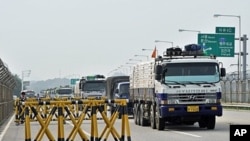For the first time in more than a year, South Korean civic groups Tuesday sent hundreds of tons of flour across the border to North Korea. But the Seoul government still refuses to dispatch any official humanitarian assistance because of concerns about distribution and tense political relations with Pyongyang. This comes as international aid groups warn that many North Koreans face a severe food shortage.
In Imjingak, seven kilometers south of the inter-Korean border, a convoy of flat-bed trucks pulled out of the Imjingak Peace Park carrying 300 tons of flour, bound for North Korea.
The aid came from local civic groups, which had been banned from sending food across the border, ever since Seoul blamed the North for sinking its navy ship, the Cheonan in March, 2010.
The head of the Korea Sharing Movement, Rev. In Myung-jin says the flour will help feed 22,000 North Korean children. But he says that charities, alone, cannot help all those in need.
“Our support through the NGO is very little, not enough to support [stop] the starvation in North Korea. So we try to urge our government to support North Korea,” he said.
But Seoul’s Ministry of Unification, the government body that handles relations with North Korea, says it is not ready to provide any official humanitarian assistance.
That is despite calls from the United Nations World Food Program and other international organizations that warn the North is once again facing severe food shortage.
Earlier this month, the European Union announced that it will soon dispatch $14 million worth of aid to help those at greatest risk of going hungry - women and children. EU officials say they have received unprecedented access to ensure the food is not diverted to feed the north’s military.
However the EU’s decision has not swayed Seoul, says Cho Joong Hoon, director of the Humanitarian Assistance Division at the Unification Ministry.
He says that the EU decided to send emergency aid to North Korea based upon what they witnessed after visiting North Korea. Seoul does approve of the EU's decision, but the South Korean government is not sending aid because of current North-South issues.
Those issues include the sinking of the Cheonan, which Pyongyang denies, and North Korea’s attack on Yeonpyeong Island this past November. Seoul wants an apology for both incidents.
But there are recent signs of improvement in inter-Korean relations. Last week, envoys from both Koreas met on the sidelines of a regional security forum in Bali, Indonesia, where both pledged to return to multinational talks about North Korea’s nuclear weapons program. Those negotiations have been in deadlock for more than two years.
South Korean Groups Send Truckloads of Flour Into North




